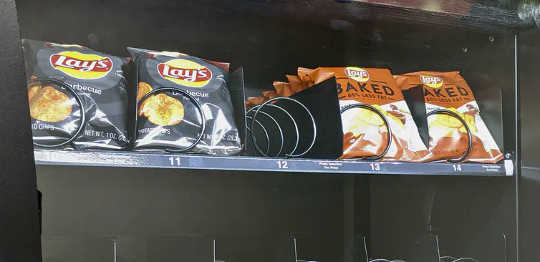
Bigger, or smaller, isn’t always better. Image by gingerbreadca
The big idea
Dieters looking for a healthier substitute of their favorite high-fat food – such as a bag of potato chips – typically have two choices in the grocery aisle: a smaller package of the exact same food or a larger portion of a “light” version. In a series of studies, we put this choice to consumers and found that people who frequently try to cut back on their eating or are essentially always on a diet – known as “restrained eaters” – prefer the larger portion size of the light version, even though both contained the exact same number of calories. Participants who indicated that they rarely dieted tended to pick the smaller size with the full flavor.
Our first study involved a vending machine choice between a medium-sized bag of Lay’s Baked BBQ potato chips and a smaller package of the regular version – both 150 calories. Participants who took a survey in which they reported frequently trying to cut back on their eating – for example, by taking smaller servings and skipping meals – opted for the larger bag of baked chips. We got similar results over four additional studies involving other snacks, such as popcorn and cookies.
 Participants in one of the studies were asked to choose between these two types of chips. One is larger and ‘baked,’ the other is small and regular. Both have the same number of calories. Ryan Corser, CC BY-SA
Participants in one of the studies were asked to choose between these two types of chips. One is larger and ‘baked,’ the other is small and regular. Both have the same number of calories. Ryan Corser, CC BY-SA
Why it matters
People tend to want food to be tasty, healthy and filling. Our study’s restrained eaters were definitely interested in choosing a snack that seemed healthier, but their choice of the larger size suggested they wanted a snack that they felt would make them feel full as well – possibly at the expense of taste. Feeling full can help people consume fewer calories overall.
The problem is research suggests eating more of lighter foods might not make people feel full, and this may point to a reason why most diets fail. Some psychologists argue that restrained eaters do not achieve the health and weight outcomes they desire possibly because, in depriving themselves of the fattier, tastier food, they may later engage in binge-eating or overconsume.
By opting for the lighter, less pleasurable food, even in larger packages, restrained eaters might be depriving themselves of the food they actually crave – regular chips, buttered popcorn or a sugary cookie.
What still isn’t known
More research is ultimately needed, however, to test whether the emphasis on increasing the portion sizes that one can eat of light foods, rather than focusing on eating smaller portions of foods that are more satisfying, is a successful long-term strategy. Or, as past research indicates, might it actually backfire and contribute to failed dieting? It’s still not entirely clear.
What’s next
At the moment, we are working on new research examining how people decide what to eat, how much to eat and how frequently to eat it. For example, why do some people decide to try to avoid any treats, whereas others try to seek moderation? If they seek moderation in their diet, would they rather have a small treat every day or have a cheat day on the weekend?
We’re also trying to understand whether or not consumers actually feel as full as they think they do by eating more lighter foods rather than less of calorie-dense foods.
How we do our work
We use a variety of approaches in our research on food, including conducting lab and online-based experiments, field studies and exploring existing data sets, such as food diary data. For this particular research, we recruited participants to pick chips out of a vending machine and used online panels to simulate real-world choices.
About the Authors
Peggy Liu, Assistant Professor of Business Administration and Ben L. Fryrear Faculty Fellow, University of Pittsburgh and Kelly L. Haws, Professor of Marketing, Vanderbilt University
This article is republished from The Conversation under a Creative Commons license. Read the original article.
Nutrition books on from Amazon's Best Sellers list
"The Blue Zones Kitchen: 100 Recipes to Live to 100"
by Dan Buettner
In this book, author Dan Buettner shares recipes from the world's "Blue Zones," regions where people live the longest and healthiest lives. The recipes are based on whole, unprocessed foods and emphasize vegetables, legumes, and whole grains. The book also includes tips for following a plant-based diet and living a healthy lifestyle.
Click for more info or to order
"Medical Medium Cleanse to Heal: Healing Plans for Sufferers of Anxiety, Depression, Acne, Eczema, Lyme, Gut Problems, Brain Fog, Weight Issues, Migraines, Bloating, Vertigo, Psoriasis, Cys"
by Anthony William
In this book, author Anthony William offers a comprehensive guide to cleansing and healing the body through nutrition. He provides evidence-based recommendations for foods to include and avoid, as well as meal plans and recipes to support the cleanse. The book also includes information on how to address specific health concerns through nutrition.
Click for more info or to order
"The Forks Over Knives Plan: How to Transition to the Life-Saving, Whole-Food, Plant-Based Diet"
by Alona Pulde and Matthew Lederman
In this book, authors Alona Pulde and Matthew Lederman offer a step-by-step guide to transitioning to a whole-food, plant-based diet. They provide evidence-based recommendations for nutrition, along with practical advice for shopping, meal planning, and preparation. The book also includes recipes and meal plans to support the transition.
Click for more info or to order
"The Plant Paradox: The Hidden Dangers in 'Healthy' Foods That Cause Disease and Weight Gain"
by Dr. Steven R. Gundry
In this book, Dr. Steven R. Gundry provides a controversial perspective on nutrition, arguing that many so-called "healthy" foods can actually be harmful to the body. He provides evidence-based recommendations for optimizing nutrition and avoiding these hidden dangers. The book also includes recipes and meal plans to help readers implement the Plant Paradox program.
Click for more info or to order
"The Whole30: The 30-Day Guide to Total Health and Food Freedom"
by Melissa Hartwig Urban and Dallas Hartwig
In this book, authors Melissa Hartwig Urban and Dallas Hartwig offer a comprehensive guide to the Whole30 program, a 30-day nutrition plan designed to promote health and wellness. The book provides information on the science behind the program, as well as practical advice for shopping, meal planning, and preparation. The book also includes recipes and meal plans to support the program.
























